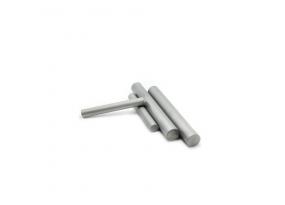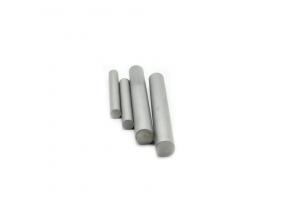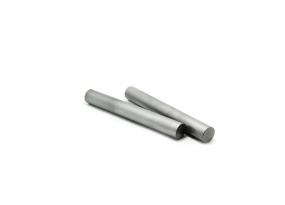What Are Tungsten Alloy Screws?
I. Properties of Tungsten Alloy Screws
The most outstanding feature of tungsten alloy is its high density (16.2–18.75 g/cm³), which allows it to provide significant weight in a small volume, making it ideal for counterweight applications where space is limited. Additionally, tungsten alloy has a high melting point (approx. 3400°C), enabling it to maintain structural stability in high-temperature environments, suitable for aerospace and industrial high-temperature applications. Its high hardness and wear resistance further enhance the screw's durability, ensuring long-term reliable operation under high stress or vibration.
Tungsten alloy screws also possess excellent corrosion resistance, capable of withstanding erosion from harsh environments like seawater, acids, and alkalis, making them suitable for applications in marine vessels and oil well logging equipment. Unlike traditional lead-based materials, tungsten alloy is non-toxic and non-radioactive, making it a preferred material for green manufacturing.
Manufactured using powder metallurgy technology, tungsten alloy screws can be produced with high-precision thread designs and complex shapes. Their standard round or custom designs facilitate easy installation and fine-tuning, meeting the precise counterweighting needs of industries like automotive and aerospace. Advanced processing techniques ensure a smooth surface finish and precise dimensions, allowing the screws to withstand high torque and mechanical stress in high-performance engineering scenarios.
II. Applications of Tungsten Alloy Screws in Counterweighting
Thanks to their high density and outstanding properties, tungsten alloy screws play a crucial role in counterweighting and fastening applications across multiple industries.
In the Electronics and Semiconductor Industry, tungsten alloy screws are widely used for weighting and fastening precision equipment due to their high density, high strength, and excellent vibration resistance. In semiconductor manufacturing, they serve as balancing counterweights for the spindles of wafer dicing and packaging equipment, effectively suppressing vibrations and reducing product rejection rates caused by imbalance. In the drones and robotics sector, these screws are used to adjust the center of gravity in small drones (e.g., in the gimbals of aerial photography drones) and to balance the joints of industrial robots. By optimizing weight distribution, they enhance movement stability and control precision, thereby improving equipment performance and operational reliability.
In the Toy and Model Industry, tungsten alloy screws play a key role in high-end models such as model aircraft, ships, and race cars. In competition-grade model aircraft, the screws are used as wing counterweights to stabilize flight attitude, reduce drag, and improve control accuracy. In model ships, they help adjust the vessel's center of gravity to enhance stability at high speeds. The corrosion resistance and high strength of tungsten alloy ensure the reliability of these models in harsh conditions. Furthermore, the non-toxic and eco-friendly nature of tungsten alloy makes it a preferred choice for toy counterweights.
In the Automotive Industry, tungsten alloy screws are extensively used for dynamic balancing and vibration control. For example, in tire balancing, these screws are affixed to the wheel rim, using their high density to fine-tune weight distribution and reduce vibrations during high-speed driving. This application is particularly common in luxury cars and racing vehicles, helping to improve driving stability and comfort. Additionally, tungsten alloy screws are used as counterweights in engine crankshafts and suspension systems. For instance, in the suspension systems of high-performance vehicles, they optimize the center of gravity to enhance handling, while their corrosion resistance ensures long-term reliability.
In the Aerospace Sector, tungsten alloy screws excel in counterweighting aircraft control surfaces and rotating components. For instance, in the fastening and counterweight systems for rudders, flaps, and ailerons, tungsten alloy screws provide substantial weight to effectively adjust flight attitude. Their high melting point and fatigue resistance enable them to withstand extreme temperatures and vibrational environments. In helicopter rotor blades and navigation systems, tungsten alloy screws are used to balance high-speed rotating parts, reducing vibration and improving operational efficiency. They are also used to balance engine crankshafts, effectively suppressing vibrations and ensuring stable engine performance under heavy loads.
In the Sporting Goods Industry, tungsten alloy screws are primarily used as counterweights to enhance athletic performance. In golf club heads, they are embedded in the rear of the club head to adjust the swing's center of gravity, optimizing ball distance and accuracy. In archery equipment, these screws serve as weights in the bow's limb or stabilizers, reducing vibration during shooting and improving accuracy.

Carbide Rods Products
All Categories
- Ground Solid Tungsten Carbide Rods
- Unground Solid Tungsten Carbide Rods
- Tungsten Carbide Rods Single Hole
- Tungsten Carbide Rods Double Holes
- Nonstandard Tungsten Carbide Rods
- Tungsten Carbide Bars And Strips
- Tungsten Carbide Plates
- Customized Tungsten Carbide Products
- Tungsten Carbide Burr Blank
- Tungsten Weight
- Tungsten carbide rods&Custom-made Carbide rods
- Cemented Carbide Plates & Non-Standard Custom-made Carbide Plates
- Cemented Carbide Strips & Non-Standard Custom-made Carbide Strips
- Cemented Carbide Die & Non-Standard Custom-made Carbide Die
Contact Us
HAO Carbide Co., LTD.
Catherine Tang
Tel: +86-731-22199705
Fax: +86-731-28260602
Mob: +86-13975383023
Email: Catherine@haocarbide.com
Web: www.hao-carbide.com
Address: Building 3, Power Valley Industrial Park, Zhuzhou City, Hunan Province, China



